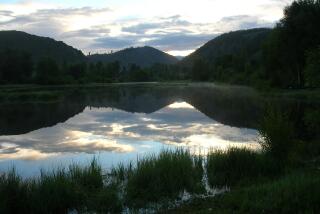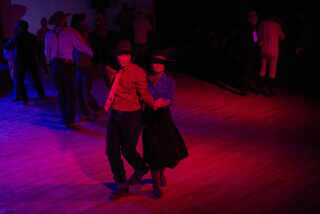‘Prairie Preacher’ Finds Amazing Grace in Country Ministry
- Share via
GROVER, Colo. — The sun rises softly on the plains, spreading light evenly across golden wheat fields and the timeless prairie. There are stretches where there is little to see but the land and the sky and, through the eyes of the Rev. Gertrude Horn, the love of God.
This is not the Colorado that most people visualize. From here, the Rockies are but a faded blue wrinkle on the western horizon, visible primarily by the contrast of lingering patches of long-ago snow. The closest city is Cheyenne, Wyo., about 60 miles to the northwest.
Not everyone can love this land, but Horn, 91, known around these parts as the Prairie Preacher, has filled her soul with its nocturnal whispering wind, its vastness and its people. To see spring emerge from winter’s desolate gray is to know that God is ever present, she says, even here. And in the fall, her favorite season, the cottonwoods and elms turn gold and the stars seem close. After the hot, dry summers, there is benediction, she says, in autumn.
For 64 years, she has driven--or been driven--across this land from one small church to the next as a circuit preacher, delivering the word of God, marrying its people, celebrating their blessings, sharing their tragedy, and--more often now, it seems--burying their dead.
She came here from California in 1934. It was toward the end of the Dust Bowl era when people were passing her in the opposite direction, defeated, desperate and seemingly forsaken. The winds seemed to pick up the precious topsoil and all hope and send them swirling into the sky so that even at midday, there was darkness.
“The sun,” she says, “was blue.”
Horn and two friends, who set out from Los Angeles in a 1928 Chevrolet with $25, drove here to spread the word of God. Horn, who was born in Nebraska before moving as a child to Phoenix and eventually to Huntington Park, attended LIFE Bible College in L.A. and was ordained through the Church of the Foursquare Gospel, founded by late evangelist Aimee Semple McPherson.
Upon their arrival, the three women, who called themselves the Gospel Trio, lived in shacks, using boxes for tables. Worshipers brought them food, and sometimes, when they passed the collection plate, among the pennies and nickels and dimes totaling little more than a dollar would be a bean or two.
At one point, when the end of the Depression was not yet in sight, Horn sat at a restaurant and looked out the window. “I said that if I thought I had to live here the rest of my life, I’d just as soon die right now, but God didn’t hear that statement.”
The other two women eventually left Colorado, but Horn stayed, conducting her nondenominational services, and never again thought about leaving. This, she discovered, is home.
Over the years, there have been those, “mostly Baptist ministers,” she says, who have expressed dismay at having a woman preacher in their midst. And once, in Briggsdale, a wedding had been planned, but when the father of the bride discovered Horn was a woman, he found a different church.
“But mostly,” Horn says, “people have welcomed me and been very gracious.”
To survive on this land requires durability, and such durability, Horn says, requires faith. Even now, as combines lay in wait for the dew to lift so they can munch away at the best wheat crop in years, prices are low.
So, on Sundays, Horn is counted on to lift spirits, to galvanize souls contained in requisite sturdy shells, to be with her flock in their brightest and darkest moments, from one generation to the next.
In the back seat of a 1991 Cadillac with almost 90,000 miles, the Rev. Horn is on her way to the first of two Sunday sermons. At one time, her circuit included six northern Colorado churches covering 1,000 square miles. But she is older now, so she has lessened her load to two. Her legs and voice are no longer steady, and sometimes it’s hard to hear and see.
She is driven by her assistant of 30 years, Carol Opdycke, who rolls through a stop sign in the middle of nowhere and turns south toward Briggsdale, where Horn has been preaching for more years than she can recall.
The wooden skeleton of an abandoned house sits among weeds on the left. A woman and three children once lived there, Horn says. “I buried them all.” Along another stretch, Horn points to another house. “A man there committed suicide.” And just down the road, “a banker lived there.”
There are three cars in front of the church as Opdycke and Horn pull up at a quarter to nine. Opdycke helps Horn out of the car, then up the stairs to the church. Already, the sun bears down and, inside, ceiling fans twirl slowly.
Merietta West sits at the piano welcoming worshipers, 15 in all, as she has done since 1952. Opdycke leads them in hymns, then Horn stands slowly to speak.
“You know, I don’t know what tomorrow holds. Do you?” Horn asks through a microphone that magnifies her soft voice. “No. None of us does, but I do know who holds tomorrow. God is with us today, tomorrow and always.”
Seated quietly alone, Lillian Gooch listens to the sermon. Gooch has missed few services, perhaps three in the last four years. She has known Horn since about 1940.
“We never had a lot of money, and once when I was a little girl, I’d had a dream that there was a bunch of clothes that I got, and that evening when I got home from school, [Horn had] brought us three children a big box of clothes and food and everything,” Gooch says.
Such stories are not unusual. Horn has driven the ill and injured through blizzards to hospitals 60 miles away. Drifters have come to her for food and clothing, a place to stay--a reason to believe.
By 10 a.m., Opdycke and Horn are back in the car headed for Hereford, 25 miles away. Even now, with fewer churches, they put on nearly a thousand miles a week.
Horn founded the church in Hereford during the 1940s. She bought an old schoolhouse for $500 and had it transported 25 miles. The building was set in place on a Christmas Eve.
One of her tasks during such times of war was to help deliver death notices to families of fallen soldiers. When people saw her coming, they would immediately think the worst, so to try to set them at ease, she made it a practice to sing or whistle whenever she was out on her rounds.
Opdycke swoops around an unhurried procession of trucks and combines en route to Hereford. She and Horn arrive at the small white church on a hill 10 minutes early. Horn’s sermon again addresses God’s ever-presence and the importance of faith.
Seated near the back are Cheryl Hauer and four of her five children. Hauer’s 70-year-old father has been under treatment for his asthma for four years, and Horn visits him in Cheyenne every couple of weeks. A son has taken over the family spread.
Horn fills her week by visiting the ill, counseling the troubled. There is always work to be done, she says, in delivering people to the Lord. The most difficult part of her work is burying one generation after the next; and the time will come, she knows, when her flock will gather to bury her.
Horn says she will be ready when that time comes. She has heeded the calling she felt as a young woman and devoted her life to God and the people of this prairie. Like the solace of autumn that soon will come, there is benediction in that.
More to Read
Sign up for Essential California
The most important California stories and recommendations in your inbox every morning.
You may occasionally receive promotional content from the Los Angeles Times.










